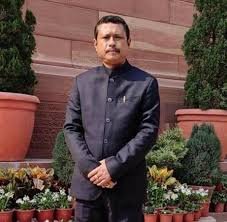Manipur’s tribals and Meiteis have faced years of state brutality, yet the Maharaja’s anger surfaces only when his own pride feel slighted.
BY Navin Upadhyay
November 22, 2025: In a state where hundreds have been killed, thousands displaced, and justice routinely smothered in the smoke of tear gas, Manipur’s political theatre has found its newest outrage: a senior police officer stepped inside the palace gates of Maharaja Leishemba Sanajaoba.
Yes — a gate. A compound. A boundary wall.
Not a killing. Not an assault. Not a custodial death.
A gate.
The MP, who is also titular king of Manipur, has demanded stern action against an Inspector General of Police for entering his palace premises while chasing violent protesters. That offence, he insists, violates “tradition, sanctity, and respect.”
But for many in Manipur — especially the tribal communities who have borne the brunt of state violence — the uproar sounds less like a defence of tradition and more like a masterclass in selective sensitivity.

READ: Kuki-Zo Council Slams Bid to Breach Buffer Zone in Manipur
When a Palace Gate Hurts More Than Human Lives
For years, Manipur has lived under the long shadow of state violence — a brutality felt by both tribals and Meiteis alike.
Fake encounters. Custodial killings. Lathicharges. Tear-gas shells hurled like festival confetti.
Yet through all of this, the royal MP seems to find his voice only when his “own” people — or his own pride — happen to be on the receiving end.Where was this outrage when:
Four Kuki-Zo teenagers were gunned down in Churachandpur recently in a controversial encounter?
No demand for inquiry. No royal anguish. No thundering speech in the Rajya Sabha.
March 8 happened, when police unleashed brutal force on tribal women protesting the “free movement” agreement — tear gas blanketing the sky, one youth killed, dozens injured?
Silence.
Women in Saikul were beaten bloody last December, one of them left permanently blinded after a savage lathicharge by security forces?
Not a word.
Hundreds of tribal homes were torched, lives uprooted, bodies left unclaimed out of fear?
No emergency statement. No plea for peace. No condemnation of the brutality.
But one police officer entering the palace grounds while dispersing agitators?
That instantly becomes an “attack on dignity.”
The contrast is not just ironic — it is obscene.
Maharaja Sanajaoba is not a community leader for the valley alone.
He is a Rajya Sabha MP representing the entire state. Yet his moral compass seems unable to point beyond the palace walls.
What Does Tradition Mean When the Present Is Burning?
Yes, Manipur’s monarchy is part of its history. Yes, the palace is a symbolic institution.
But symbolism cannot eclipse suffering.
Tradition cannot become a refuge from accountability.
In a democracy, a representative’s dignity is measured not by how loudly he defends stone walls, but by how fiercely he defends human lives.
Selective Outrage Has Consequences
When leaders choose silence over solidarity, they make a choice about whose pain matters.
When tribal deaths do not warrant statements but a palace breach does, the message is stark: Some lives count. Some don’t. Some spaces are sacred. Some aren’t.
And in Manipur, that hierarchy of outrage is killing hope faster than bullets kill bodies.
If Maharaja Sanajaoba’s dignity has been violated, let him pursue redress.
But let him also speak — loudly, unequivocally — for those whose dignity has been shattered far more violently than any palace can imagine.
Because Manipur is burning.
And history will remember not the breached gate, but the breached humanity.














